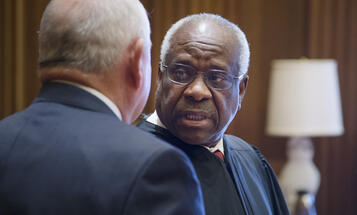
The campaign money chase makes the sliver of Americans who donate large sums the most important citizens, and they are both unrepresentative (90 percent of 2012 presidential donors were from majority-white neighborhoods) and, by definition, doing well in our inequitable economy. A quarter of all the money in the presidential race through 2015 came from donors who gave more than $1 million. It’s not much better in congressional races, with the majority of money coming from $1,000-plus donors. To put that in context, $1,000 is more than the average U.S. worker makes in a week.
Is this just an outgrowth of inequality, or does it actually help fuel it? Research suggests it’s both, because the donor class has outsized influence over policy outcomes. A recent study found that senators’ positions reflect the average donor’s wishes over their constituents’ views, and even over voters in their own party. And yet another study calculated that the wealthy have 15 times more political efficacy than the middle class.


